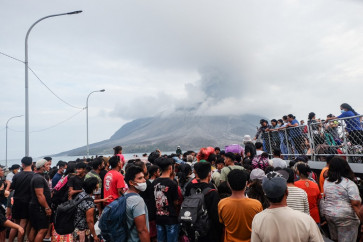RI needs to be more ambitious in saving environment: OECD
While the country had made some progress in integrating environmental issues in its policy, Indonesia needed to be more ambitious to achieve its environmental and climate targets in order to save the planet and keep economic development high, the Organization for Economic Cooperation and Development (OECD) said in its latest report
Change Size

W
span>While the country had made some progress in integrating environmental issues in its policy, Indonesia needed to be more ambitious to achieve its environmental and climate targets in order to save the planet and keep economic development high, the Organization for Economic Cooperation and Development (OECD) said in its latest report.
During the recent launch ceremony of the organization’s latest report titled OECD Green Growth Policy Review of Indonesia 2019, OECD environment director Rodolfo Lacy said Indonesia’s economy was “more inclusive and sustainable than ever”.
The report, the first of its kind, aims to review Indonesia’s policy framework for green growth while also examining the state of the country’s environment and green growth performance since 2005. The OECD was assisted by several institutions in writing the report, including the Environment and Forestry Ministry and the National Development Planning Agency (Bappenas).
“Indonesia has made progress in decoupling environmental versus economic growth. Between 2005 and 2016, greenhouse gas emissions and energy supply have grown at a slower pace [than the country’s] gross domestic product [GDP]. That is a good sign,” Lacy said recently.
Such progress, he added, took form in the next National Medium-Term Development Plan (RPJMN) which included low-carbon development principles. The paradigm focuses on the construction of sustainable infrastructure as well as the protection and restoration of natural infrastructure, such as wetlands and forests. Moreover, the low-carbon development also requires resources and energy efficiency.
He also mentioned a green bond issued by the government in order to push for green investment. In February, the government issued green sukuk (sharia-compliant bonds) worth US$750 million in line with its commitment to environmentally friendly green financing. It marked the second time the government had banked on the global sukuk market after it became the first sovereign green sukuk issuer last year, raising $1.25 billion.
The country’s GDP grew more than 5 percent annually in the 10-year period. It was later followed by a reduction in the poverty rate by half as well as an increase in living standards and access to public services.
The report acknowledges that the economy has improved thanks to the exploitation of natural resources, which accounted for more than 20 percent of GDP and 50 percent of exports in 2017.
“However, environmental pressure remains high in Indonesia. Energy demand and greenhouse gas emissions will continue to rise. [...] This will create great economic and health costs, especially for the people,” Lacy said, adding that more efforts would be needed to meet the country’s 2030 climate target.
In 2016, Indonesia pledged in its nationally determined contributions (NDC) to reduce its emissions by 29 percent, or by 41 percent with international support, against the business-as-usual scenario by 2030.
The OECD’s report noted two sectors that should be improved in order to help the country meet its climate commitment: land-use change and energy.
The organization praised the country’s move to reduce deforestation and uphold a moratorium on new business permit issuance in natural forest and peatland.
Environment and Forestry Minister Siti Nurbaya Bakar said the country had succeeded in curbing deforestation for the last several years, as only 630,000 hectares of forest was cut down between 2015 and 2016 — declining from the previous year’s 1.09 million ha.
She added that the number had been verified by other parties, referring to Norway which agreed to make the first payment under the Reducing Emissions from Deforestation and Forest Degradation (REDD+) scheme based on the number.
“Regarding the moratorium, we are trying to make it permanent. We are currently discussing the matter with the state and cabinet secretary. Hopefully, it will be completed by the end of this month with the President issuing a decree,” said the Environment and Forestry Ministry’s climate change director general, Ruandha Agung Sugardiman.









